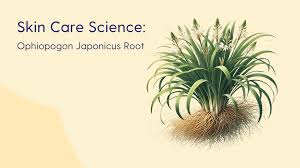Ophiopogon Japonicus Root in Skin Care
You may see an ingredient called Ophiopogon japonicus root listed on many different skin care labels, including cleansers, moisturizers, and serums. This ingredient, commonly known as mondo grass or Japanese lily, or “Mai Dong” in traditional Chinese medicine, is known for its anti-inflammatory, antioxidant, and skin-soothing and hydrating properties.
Because it can help to repair the skin barrier and rehydrate the skin, Ophiopogon japonicus root extract is most commonly found in skin care products for dry skin, although it can be suitable for a range of Baumann Skin Types, depending on your skin’s specific needs.
Ophiopogon japonicus root extract has strong anti-inflammatory, antioxidant, and skin-hydrating benefits.
It’s usually well-tolerated by most skin types and doesn’t have notable side effects.
You’ll find it in a variety of cleansers, moisturizers and other products for barrier repair and dryness.
What Is Ophiopogon Japonicus Root?
Ophiopogon japonicus is a small, hardy grass native to East Asia, especially Japan, China, and Korea. Its root has long been used in traditional Chinese and Japanese medicine to support lung health, hydration, and immune function. In skin care, Ophiopogon japonicus root extract is used for its ability to promote a healthy skin barrier, improve hydration, soothe irritation, and protect against damage caused by oxidative stress.
Active Compounds in Ophiopogon Japonicus Root
Some of the most notable compounds in mondo grass that make it such a beneficial ingredient in skin care include:
Ophiopogonin is a type of plant compound called a saponin that is located in the root of the Ophiopogon japonicus plant. This compound is what gives this plant its strong anti-inflammatory, antioxidant, and even anti-cancer effects (3).
Polysaccharides , particularly β-fructans, found in mondo grass are believed to also contribute to this plant’s anti-inflammatory properties by reducing nitric oxide and certain inflammatory pathways (4). Additionally, polysaccharides are known for their ability to retain moisture, improving skin hydration and supporting its protective barrier.
Flavonoids like methylophiopogonanone A and methylophiopogonanone B are antioxidant-rich compounds found in mondo grass that effectively neutralize free radicals (5). This helps to protect the skin from oxidative stress that could otherwise result in premature aging and other unwanted effects.
Beta-sitosterol is plant-based sterol with soothing and anti-inflammatory properties. It is molecularly similar to cholesterol and helps to calm irritated skin and supports the health and function of the skin barrier.
Skin Benefits of Ophiopogon Japonicus Root
As you can see from the many beneficial plant compounds naturally found in Ophiopogon japonicus root extract, this ingredient comes with a number of benefits for the skin. These three are the most notable:
Anti-inflammatory properties. The bioactive saponins and plant sterols, particularly beta-sitosterol, found in mondo grass give this ingredient its strong anti-inflammatory properties. These compounds modulate inflammatory responses by inhibiting pathways associated with pro-inflammatory cytokine production, reducing visible redness and irritation. Studies suggest that these mechanisms can be especially beneficial for those with sensitive or reactive skin, helping to alleviate symptoms commonly associated with inflammatory conditions like rosacea and eczema (6)
Antioxidant properties. Flavonoids in Ophiopogon japonicus root neutralize reactive oxygen species (ROS) responsible for oxidative stress. Oxidative stress accelerates skin aging by damaging collagen and elastin, the proteins that give the skin its firm structure and elasticity. By reducing this damage, these antioxidants can protect against signs of premature skin aging like fine lines, wrinkles, and pigmentation issues.
Barrier repair and hydration. The polysaccharides in mondo grass improve the skin’s ability to retain moisture and strengthen its protective barrier. This process not only helps to prevent transepidermal water loss (TEWL) but also helps to keep irritants and allergens sealed out of the skin. Additionally, the saponins and plant sterols in this plant have been shown to contribute to healthy skin barrier function.
Side Effects of Ophiopogon Japonicus Root
Ophiopogon japonicus root is generally safe for topical use in most Baumann Skin Types. However, in some rare cases, this ingredient may cause mild skin irritation for some people, especially those with very sensitive skin.
Skin Care Products with Ophiopogon Japonicus Root Extract
You’ll often find Ophiopogon japonicus root in hydrating serums, moisturizers, and barrier-repair creams. Because of its soothing and moisturizing properties, Ophiopogon japonicus root extract is especially common in products designed for sensitive or dry skin types.
Below are just a few of my favorite high-quality skin care products that contain this ingredient.
Bottom Line
Ophiopogon japonicus root, also known as mondo grass, Japanese lily, or Mai Dong, is a plant-derived ingredient found in many cleansers, moisturizers, and serums aimed at improving barrier function and hydrating. In addition, this ingredient has strong anti-inflammatory and antioxidant properties, making it a beneficial ingredient for those with dry or sensitive skin.
DQH Knowledge drop: In your 20s, your skin cell turnover decreases. (Cell turnover is a key component in keeping your skin youthful.) You know what else slows down? Your collagen production. Starting in your 20s, collagen decreases by about 1 percent per year. Should you want to prevent fine lines and wrinkles, start by eliminating behaviors that contribute to premature aging. “If it’s bad for you, it’s bad for your skin,” says dermatologist Michel Somenek.
“Cigarette smoking reduces blood flow to the skin and causes premature wrinkling and a dull skin texture. Making the repeated pursed motion to inhale can also cause smoker’s lines. Alcohol and recreational drugs are toxins for the skin that damage its cellular structure and DNA,” Somenek tells us. “The faster you eliminate vices while you are young, the better chance your skin and body have to recuperate.” Also, adopting an anti-aging routine in your 20s is key. After all, the best offense is a good defense. We spoke to Somenek and experts Joshua Ross and Audrey Kunin to find out more.
Keep reading for the best anti-aging products for your 20s, according to skincare professionals.
Sunscreen
“We all know that the sun is the number one cause of skin aging and starting the prevention in your 20s is very important,” Ross says. “The majority of your sun damage won’t start to appear until you’re in your 30s, so don’t wait until you see it surface or you’ll be behind the curve. Stay ahead of it with a good-quality zinc-based sunscreen worn daily.”
Farmacy Green Defense Daily Mineral Sunscreen
An invisible sunscreen with SPF 30, plus botanical extracts meant to protect skin with tons of antioxidants. Bonus: It’s clean and fine to use under makeup.
Bareminerals Complexion Rescue™ Tinted Moisturizer Broad Spectrum SPF 30
Although we recommend you use your SPF and moisturizer separately, we also understand moments when you don’t have time or energy for that extra step. For those times, this bareMinerals moisturizer is a great thing to have on hand.
Vitamin C Serum
“A great introduction to anti-aging is to start with a vitamin C serum in your morning skincare routine,” Ross says. “It’s a powerful antioxidant that will neutralize free radicals and brighten the skin.” He adds that it’s a great way to counteract the effects of the sun’s harmful rays, which, as previously mentioned, are among the biggest causes of premature aging.
Drunk Elephant C-Firma™ Vitamin C Day Serum
The Drunk Elephant C-Firma is a lightweight serum that promises to give skin a glow by combining the brightening powers of vitamin C with ferulic acid, l-ascorbic acid, and vitamin E. The included sodium hyaluronate is meant to replace hydration loss, so you shouldn’t have to deal with any irritation.
Sunday Riley C.E.O. Rapid Flash Brightening Serum
This potent serum is jam-packed with vitamin C (15 percent, to be exact), which means it’s a potential superstar at both brightening skin and dousing it in antioxidants.
Peptides
Using peptides on your skin has many benefits, says Somenek. “The skin barrier is what defends the body against pollution, UV rays, bacteria, and toxins. It can be damaged by several everyday factors. Using topical peptides aids in building a stronger barrier,” he says. “Peptides comprise elastic fibers, which are a type of protein. These fibers help to make skin appear taut and firm. Peptides can also help repair damaged skin, relieve inflammation, and even out skin tone. Some peptides can kill acne-causing bacteria that is common in 20-somethings.”
Kunin agrees, saying, “Peptides are an excellent entry point for supporting collagen.” She recommends looking for face and eye treatments that contain these collagen-boosting powerhouses.
Charlotte Tilbury Magic Eye Rescue Cream
This Charlotte Tilbury super-emollient eye cream has a base of coconut oil and shea butter (read: it’s incredibly hydrating). Botanicals plus peptides are meant to help reduce dark circles and boost collagen, respectively.
This creamy moisturizer serves up potent collagen-boosting peptides and pycnogenol, and antioxidant-rich vitamin C. “Instead of sitting on top of the skin, peptides penetrate the outer layer so they go deep. The ‘signals’ they send tell the cells to produce elastin and collagen, which are needed for youthful-looking skin,” explains Somenek.
At-Home Peel Pads
Remember that skin cell turnover fiasco we talked about earlier? One way to help support it is by exfoliating. “Exfoliation is important to help keep skin fresh and luminous,” Kunin says. She recommends using at-home peel pads as an easy and effective way to exfoliate.
“The goal in your 20s is to fight the slowing pace of cell turnover. It is wise to use products that gently exfoliate, yet still remove oil and other impurities. Products that have Alpha Hydroxy Acids (AHA) or Beta Hydroxy Acids (BHA) are a good choice.”
According to Somenek, you should only exfoliate two to three times a week. “People of all ages are guilty of over-exfoliating and that can be too much of a good thing,” he says.
Dermadoctor Kakadu C Intensive Vitamin C Peel Pad
A few swipes of this Derma Doctor powerful peel pad promise to leave your skin glowing and smooth, thanks to the seven (yes, seven) types of chemical exfoliants, including AHA and BHA. It also contains vitamin C via Kakadu plum extract for added brightening and antioxidant protection.
KEY INGREDIENTS Kakadu plum extract is sourced from the Kakadu plum, a fruit grown in northern Australia. It contains vitamin C, which restores the skin’s natural barrier, increases collagen production, and soothes irritation.
Dr. Dennis Gross Skincare Alpha Beta® Universal Daily Peel Pads
These are the gold standard of peel pads, with a cult following and over 900 five-star reviews on Sephora. They’re easy to use and contain a blend of anti-aging exfoliating acids.
Emollient Night Cream
“In your 20s, you need to start upping the hydration in your skincare routine. You may have been cautious of over-moisturizing because of acne in your teens, but as you enter your 20s, your skin transitions and becomes drier,” Ross says. “I recommend an emollient night cream added into your evening skincare regimen.”
“Twenty-somethings need to make sure that they are not using creams that will clog their pores and cause excess oil production,” says Somenek. Opt for non-comedogenic products.
Cerave Skin Renewing Night Cream
One great choice is the CeraVe Skin Renewing Night Cream, which is a non-comedogenic night cream that leaves skin soft and glowy. It combines the moisturizing powers of ceramides and hyaluronic acid.
RoC Retinol Correxion Max Hydration Creme
“The best night cream ingredients contain retinol, benzoyl peroxide, and/or salicylic acid or hyaluronic acid. The goal is to moisturize, yet remove excess oil,” says Somenek. This Roc Retinol Correxion cream fits the bill as it contains both hyaluronic acid and retinol so it promises to moisturize while also being non-comedogenic.



